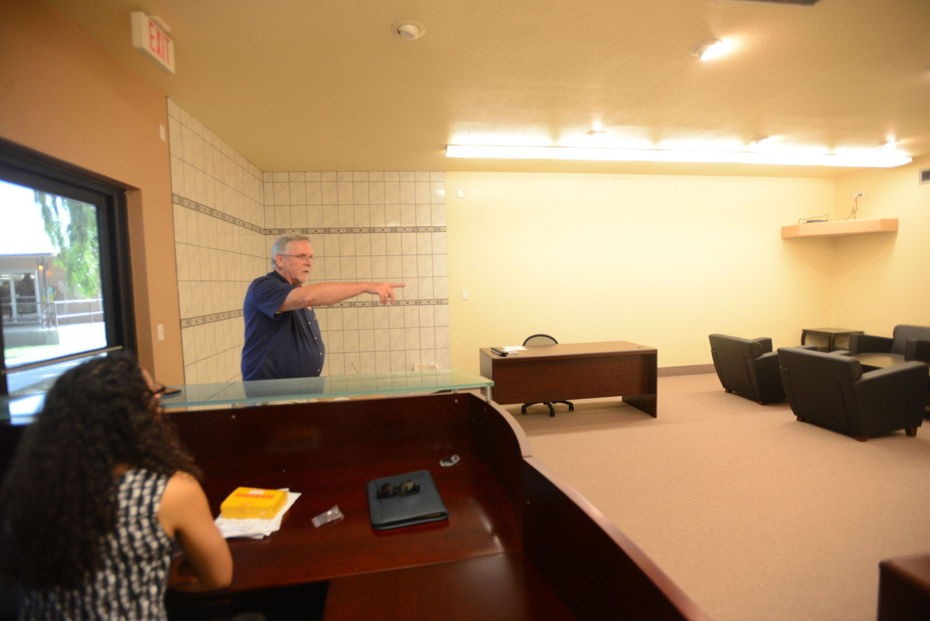
Imperial Valley College Dean of Counseling Ted Ceasar explains the changes that are in being made inside the Casbah in the college, which is being transformed to house the college's veterans center to help provide several services to veterans or active-duty personnel studying at IVC. Listening to Ceasar is IVC Student Success Specialist Tara Wells on Friday. MARIO RENTERIA PHOTO
Veterans will soon have a place to call their own at Imperial Valley College, a home away from home, if you will, as the campus strategizes a plan to boost numbers of students and eventual graduates who are military veterans or active-duty personnel.
With funding provided from the Student Success Act of 2012 (Senate Bill 1456), the former Casbah Room in the Student Center has been transformed into a place where military veterans and active-duty personnel can get the help and support they need to successfully navigate college life. Staff will include a student success specialist to oversee the center, including a counselor dedicated to working with veterans, along with clerical staff and student mentors.
A specially designated student success specialist and counselor have been appointed and will be staffing the center along with an office assistant.
"Once these positions are in place we will start hiring peer mentors and tutors and start seeing veterans in the center, possibly in two or three weeks," said Ted Ceasar, IVC's dean of counseling.
A grand opening is planned for Veterans Day on Nov. 10.
The college has long been aware of the need to better-serve veterans, but it takes money to do so, and while previous grant applications were filed, they were also declined. Then along came the Student Success Act, which is intended to address student equity and achievement gaps, enabling colleges throughout the state to level the playing field for first-time students.
Before IVC could tap into any funding, it had to identify achievement gaps based upon the following criteria: ethnicity, gender, age, veteran status and the economically disadvantaged.
"Five things needed to be considered, based on how numbers at the college represent the community population," Ceasar said. "Those are access, course completion, degree completion, transfer to upper division programs and basic skills classes and ESL."
"We're working to address the gap," Ceasar said. "This part of the plan is focused on vets."
As the data was collected, "We found first that veterans are considered under-enrolled. We found that veterans do well at course completion but don't have comparable degree completions and transfers," he said.
In addition, "We found the numbers of initial interest are higher than the numbers of those who initially enroll," said Jose Carrillo, IVC's director of institutional research.
A first step has been to get the information out to veterans and active-duty military personnel, through the local Naval Air Facility El Centro, agencies that serve veterans, veterans' groups themselves and other entities.
"A major objective is to recruit veterans or make them aware of the advantages of coming to IVC for their education," Ceasar said.
Dubbed "Operation AT*EASE" (Academic Transition and Employment Access for Student Excellence), the veterans center will provide a holistic approach to meet the emerging needs of local veterans by creating pathways for their transition from military to college to work.
The project will build on IVC's 64 programs of study, which will provide veterans with a wide array of choices of vocational, technical and academic programs, which will meet their career needs.
"The plan is to develop goals and activities to close the gap," Ceasar said.
The center will provide assistance with academics, health and wellness and camaraderie.
The peer mentors will be hired through work-study programs.
"We're striving when possible to have veterans serving in these positions," Ceasar said, part of the "Hire a Hero" portion of the plan that will bring community awareness for veterans while promoting the available internships and hiring opportunities for them.
As for the center itself, Ceasar said, "We want it to be a really warm, comfortable and inviting place."
It includes a lounge area and computers to use for registration, enrollment and projects, with specialized software designed to help non-traditional students with academics.
There will be a connection through the health center with programs and health fairs targeted to assisting returning vets and their needs.
Added Ceasar, "We want them to have that place that is their spot, where they can feel comfortable."


